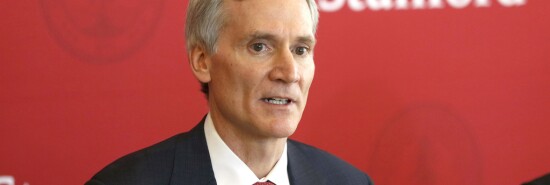
University that helped censor misinformation admits to spreading it
Hudson Crozier
Video Embed
Stanford University President Marc Tessier-Lavigne has resigned after an investigation into manipulated research data in several papers that he co-authored. While he did not engage in any misconduct himself, he admitted to failing to pursue corrections quickly and diligently.
“Although I was unaware of these issues, I want to be clear that I take responsibility for the work of my lab members,” Tessier-Lavigne said in a statement. “This decision is rooted in my respect for the University and its community and my unwavering commitment to doing what I believe is in the best interests of Stanford.”
SENATE COMMITTEE TO CONSIDER ADVANCING BIPARTISAN CHILDREN’S ONLINE SAFETY BILL
His response to the controversy is one of clear humility and self-awareness. Normally, there would be no reason to hold these mistakes against Stanford. But some things about it are not so humble.
Stanford participated in two projects with the federal government to help Big Tech platforms censor what they collectively perceived to be false or misleading information. The university, among other entities, faces a First Amendment lawsuit for doing so. Stanford helped catapult the budding field of pseudo-research on digital “misinformation” and “disinformation,” terms that have taken academia by storm.
Stanford’s two initiatives, dedicated to censoring election and COVID-19 vaccine claims, show the elitist philosophy behind these efforts. The related documents assert that incorrect statements about political topics threaten to “undermine confidence in” crucial institutions and tear the very fabric of society. The reason the threat is so severe, the researchers plainly believe, is that the public cannot be trusted to discern the truth. That’s why the COVID-19 project even censored “true” statements about vaccines as long as they had the potential to “fuel [vaccination] hesitancy.”
To keep us from the danger of being wrong, government officials and people with fancy degrees demand that we turn over our free speech rights and be kindly shepherded by the “experts.” Only the minds of these credentialed experts can be trusted, so we hear. But there is no such thing as a misinformation or disinformation “expert.” Embracing this title is the same as saying you are an expert at being right. Through doctored research papers, we have now been reminded of the fact that Stanford and its leaders are capable of being very wrong.
The government bureaucrats to whom Stanford wants us to be thought-slaves have also been wrong about the very discussions they want to shut down. The credibility of the COVID-19 lab leak theory is the latest and perhaps most egregious example. Stanford’s censorship coalition also claimed COVID-19 cases among the vaccinated were “extremely rare” before walking it back.
The simple lesson behind this is that no human being can be trusted as an arbiter of truth. Nevertheless, if the censors think we’re wrong, whether we are or not, they believe we have forfeited our right to speak. By their standards, only they get to recover from mistakes in the conventional way and move on. The sheer arrogance of this movement should be clearer than ever.
CLICK HERE TO READ MORE FROM THE WASHINGTON EXAMINER
Hudson Crozier is a summer 2023 Washington Examiner fellow.
